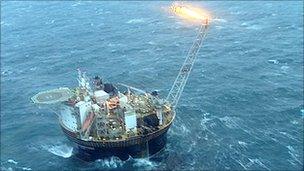Offshore oil and gas industry 'enjoying boom'
- Published

Investment is expected to increase to £8bn during 2011
Britain's offshore oil and gas industry is enjoying a sustained boom in investment and job creation, according to the sector's annual business survey.
Oil and Gas UK said the rate of decline in production from UK waters would be halved over the next five years.
The body represents about 100 major operators and suppliers.
It said rising oil prices led to companies committing to continued drilling programmes and increased development of proven reserves.
The development plans now being considered by production companies could sustain £40bn of investment during the next five years.
Rising financial returns for oil and gas investment mean increased effort to extract more from older oil fields. New Atlantic fields to the west of Shetland are expected to provide as much as quarter of UK output within nine years.
The survey found investment at £4.9bn in 2009 has been increased to £6bn for 2010, and is expected to increase to £8bn during this year.
That increase is being linked to between 10,000 and 15,000 new jobs, with the industry's training body, Opito, recruiting from those made redundant in other sectors.
The annual rate of declining output is being halved to roughly 3% over the next five years, Oil and Gas UK claims. That means some fields should still be producing after 2040.
The number of exploration and appraisal wells has fallen from 65 in 2009 to 62 last year, with a third of them successful.
This year's drilling rate is likely to remain around that level. Recent finds, mostly in small fields, add between 300m and 400m barrels of oil and gas to UK reserves.
The survey found that the industry is now targeting a total 11.6bn barrels of oil or its gas equivalent, a rise of 1.3bn on last year's reckoning.
'Daily battle'
That is out of around 24bn barrels that could be recovered from under UK waters, given the right financial incentives and continued advances in drilling techniques.
However, Oil and Gas UK warns of rising costs. Inflation in the sector has been running at 5%, fuelled by competition for industry suppliers in other oil fields around the world.
Including that cost pressure, the price of extracting the average barrel of oil has risen by 10% in a year, as the UK industry has to work harder to produce oil and gas from old, smaller and more challenging fields.
Malcolm Webb, chief executive of the industry body, said the industry faces a "daily battle" to remain competitive.
He pushed for the UK Government to ease the cost of decommissioning older offshore equipment, estimated at £29bn over the next three decades.
"The UK's need for oil and gas will not abate over the next ten years and will do so only gradually thereafter," said Mr Webb. "We must ensure that as much as possible of the oil and gas we use is produced here to support this country's economic recovery and to improve our energy security."
Successful exploration
In a separate survey, Deloitte found Britain's 25 largest independent oil and gas companies increasing in their market valuation - up by 28% during 2010.
The business advisory firm said the smaller firms have outperformed the oil majors over the past ten years.
It placed Tullow Oil as the biggest independent, with a stock market value of £1.12bn at the end of 2010. Headquartered in London, it was strengthened by drilling activity in Ghana.
Edinburgh-based Cairn Energy remained in second place, at £5.9bn, having grown rapidly through its successful exploration in India and now prospecting off Greenland.
Premier Oil was boosted in third place by discovery of the Catcher field under UK waters, while it also operates in West Africa, the Middle East and Pakistan.
Andrew Ogram, an energy partner at Deloitte in Aberdeen, said: "Overall, 2010 was a year of recovery for the UK upstream independent oil and gas sector, with rising oil prices and greater access to capital improving investor sentiment in the sector".
- Published13 January 2011
- Published11 January 2011
- Published5 January 2011
- Published30 December 2010
- Published16 November 2010